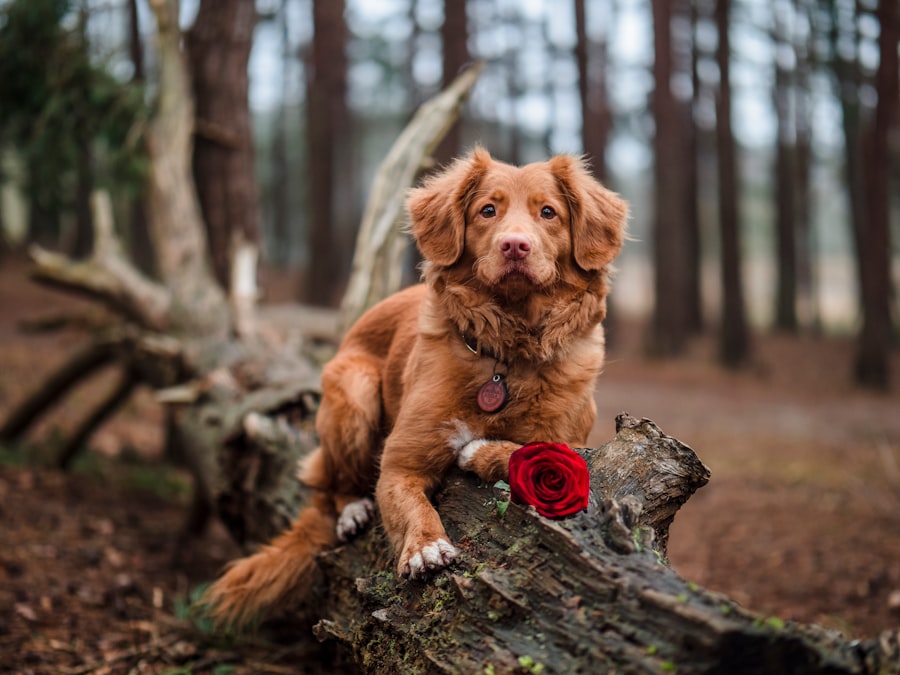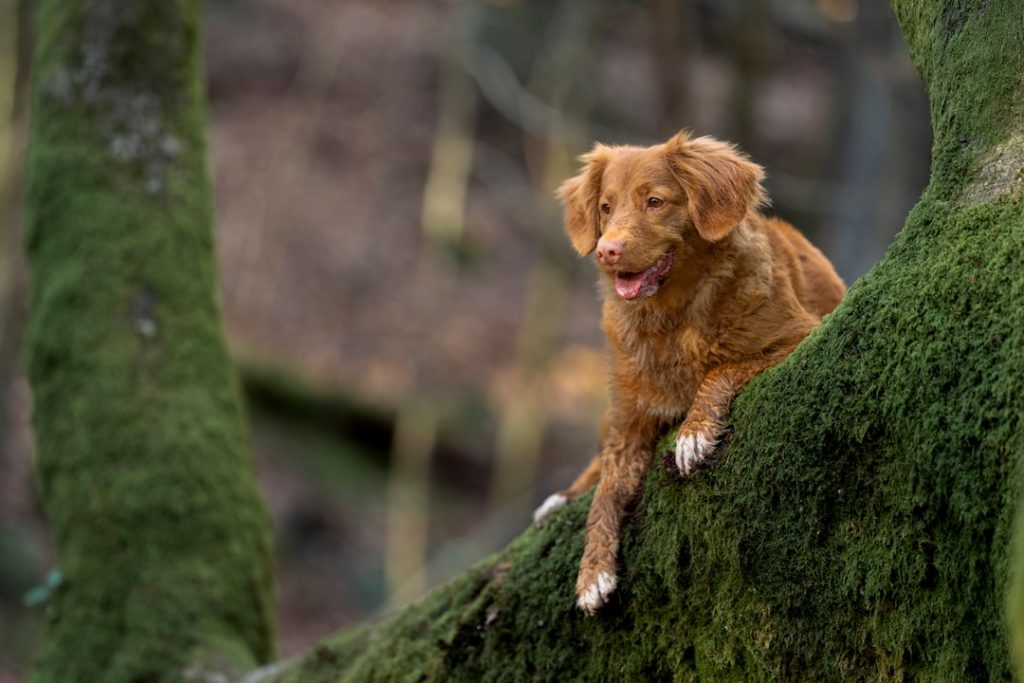The Nova Scotia Duck Tolling Retriever, also known as the Toller, is a medium-sized breed that originated in the early 19th century in the Little River District of Yarmouth County, Nova Scotia, Canada. The breed was developed to toll, or lure, waterfowl within gunshot range for hunters. The Toller is the smallest of the retriever breeds and is known for its distinctive red coat and playful nature. The breed was officially recognized by the Canadian Kennel Club in 1945 and by the American Kennel Club in 2003.
The Toller’s history is closely tied to the sport of duck hunting, as they were bred to be excellent retrievers and lure waterfowl within range of hunters. They are known for their agility, intelligence, and high energy levels, making them excellent working dogs. The breed’s name comes from the word “tolling,” which refers to the dog’s ability to entice or lure ducks and other waterfowl closer to the shore. Tollers are also known for their love of water and their strong swimming abilities, which made them invaluable to hunters in retrieving downed waterfowl. Today, Tollers are not only used for hunting but also excel in various dog sports such as agility, obedience, and flyball.
Table of Contents
- 1 Finding a Reputable Breeder in New York
- 2 The Importance of Health Testing in Breeding
- 3 The Process of Choosing a Puppy from a Breeder
- 4 Training and Socialization for Nova Scotia Duck Tolling Retrievers
- 5 The Responsibilities of Owning a Nova Scotia Duck Tolling Retriever
- 6 Connecting with the Nova Scotia Duck Tolling Retriever Community in New York
- 7 FAQs
- 7.1 What is a Nova Scotia Duck Tolling Retriever?
- 7.2 What should I look for in a Nova Scotia Duck Tolling Retriever breeder in NY?
- 7.3 How can I find a Nova Scotia Duck Tolling Retriever breeder in NY?
- 7.4 What questions should I ask a Nova Scotia Duck Tolling Retriever breeder in NY?
- 7.5 What health considerations should I be aware of when getting a Nova Scotia Duck Tolling Retriever from a breeder in NY?
Key Takeaways
- The Nova Scotia Duck Tolling Retriever originated in the early 19th century in Nova Scotia, Canada, where they were bred to lure and retrieve waterfowl.
- When looking for a reputable breeder in New York, it’s important to do thorough research, ask for references, and visit the breeder’s facilities to ensure the well-being of the dogs.
- Health testing is crucial in breeding Nova Scotia Duck Tolling Retrievers to prevent genetic diseases and ensure the overall health of the puppies.
- When choosing a puppy from a breeder, consider factors such as temperament, health, and the breeder’s knowledge and experience with the breed.
- Training and socialization are essential for Nova Scotia Duck Tolling Retrievers to ensure they become well-behaved and well-adjusted members of the family.
- Owning a Nova Scotia Duck Tolling Retriever comes with responsibilities such as providing proper exercise, grooming, and healthcare, as well as training and socialization.
- Connecting with the Nova Scotia Duck Tolling Retriever community in New York can provide valuable support, resources, and opportunities for socialization and activities for your dog.
Finding a Reputable Breeder in New York
When looking for a reputable Nova Scotia Duck Tolling Retriever breeder in New York, it’s important to do thorough research to ensure that you are getting a healthy and well-bred puppy. One of the best ways to find a reputable breeder is through the national breed club, the Nova Scotia Duck Tolling Retriever Club (USA). The club’s website provides a list of breeders who adhere to their code of ethics and breed for health, temperament, and conformation. Additionally, attending local dog shows and events can be a great way to meet breeders in person and see their dogs in action.
Another important factor to consider when looking for a breeder is health testing. Reputable breeders will conduct health tests on their breeding dogs to screen for genetic diseases that are common in the breed. These tests may include hip and elbow evaluations, eye exams, and genetic testing for conditions such as progressive retinal atrophy (PRA) and collie eye anomaly (CEA). A responsible breeder will be transparent about the health testing they have done on their dogs and will provide documentation to potential puppy buyers.
The Importance of Health Testing in Breeding
Health testing is a crucial aspect of responsible breeding, especially when it comes to a breed like the Nova Scotia Duck Tolling Retriever that is prone to certain genetic diseases. By conducting health tests on their breeding dogs, breeders can identify and eliminate dogs that carry genetic diseases from their breeding program, ultimately reducing the risk of passing on these conditions to future generations. Health testing also helps breeders make informed breeding decisions and ensures that they are producing healthy puppies.
In addition to genetic testing, health testing also includes evaluations for hip dysplasia and elbow dysplasia, which are common orthopedic conditions in many dog breeds, including Tollers. These evaluations help breeders assess the structural soundness of their breeding dogs and reduce the risk of producing puppies with debilitating joint conditions. By prioritizing health testing in their breeding program, responsible breeders demonstrate their commitment to producing healthy, well-rounded puppies that will thrive in their new homes.
The Process of Choosing a Puppy from a Breeder
When choosing a Nova Scotia Duck Tolling Retriever puppy from a breeder, it’s important to consider several factors to ensure that you are making the right decision for your lifestyle and needs. First and foremost, it’s essential to find a reputable breeder who prioritizes health, temperament, and conformation in their breeding program. A responsible breeder will take the time to get to know potential puppy buyers and will be transparent about their breeding practices, health testing, and the care they provide for their dogs and puppies.
Once you have found a reputable breeder, it’s important to discuss your preferences and expectations for a puppy. Whether you are looking for a show prospect, a working dog, or a beloved family pet, communicating your needs with the breeder will help them match you with the right puppy. Additionally, visiting the breeder’s facility and meeting the litter’s parents can give you valuable insight into the temperament and health of the puppies. It’s also important to ask the breeder about socialization and early training that the puppies receive before going to their new homes.
Training and socialization are crucial aspects of raising a well-behaved and well-adjusted Nova Scotia Duck Tolling Retriever. Tollers are intelligent and energetic dogs that thrive on mental and physical stimulation, making them highly trainable but also prone to boredom and destructive behaviors if not properly exercised and trained. Positive reinforcement training methods work best for Tollers, as they respond well to praise, treats, and play.
Socialization is equally important for Tollers, as they can be reserved or wary of strangers if not exposed to different people, animals, and environments from an early age. Early socialization helps prevent fearfulness or aggression towards unfamiliar situations and individuals. Exposing your Toller puppy to various experiences such as different people, animals, sounds, and environments will help them grow into confident and well-adjusted adults.
The Responsibilities of Owning a Nova Scotia Duck Tolling Retriever

Owning a Nova Scotia Duck Tolling Retriever comes with several responsibilities that potential owners should be prepared for. Tollers are active and intelligent dogs that require regular exercise, mental stimulation, and training to thrive. They excel in various dog sports such as agility, obedience, flyball, and dock diving, making them well-suited for active families who enjoy outdoor activities with their canine companions.
In addition to physical exercise, Tollers also require mental stimulation to prevent boredom and destructive behaviors. Interactive toys, puzzle games, and training sessions can help keep your Toller’s mind engaged and prevent behavioral issues. Regular training sessions are also essential for teaching basic obedience commands and manners as well as providing an outlet for their intelligence and energy.
Connecting with the Nova Scotia Duck Tolling Retriever Community in New York
Connecting with the Nova Scotia Duck Tolling Retriever community in New York can provide valuable support, resources, and social opportunities for Toller owners. Joining local breed clubs or training facilities can help you meet other Toller enthusiasts, participate in events such as conformation shows or performance trials, and access educational seminars or workshops on topics such as training, health care, and breed-specific issues.
Social media platforms such as Facebook or Instagram can also be great tools for connecting with other Toller owners in your area or beyond. Many breed clubs have dedicated social media groups where members can share photos, stories, advice, and support each other in their Toller ownership journey. Additionally, attending local dog events or meetups can provide opportunities for your Toller to socialize with other dogs and for you to connect with like-minded individuals who share your love for the breed.
In conclusion, owning a Nova Scotia Duck Tolling Retriever can be a rewarding experience for individuals or families who are prepared to meet the breed’s physical and mental needs. By finding a reputable breeder who prioritizes health testing and responsible breeding practices, potential owners can ensure that they are bringing home a healthy and well-adjusted Toller puppy. Training, socialization, and ongoing support from the Toller community can help owners provide their dogs with a fulfilling life full of love, companionship, and meaningful activities.
If you’re considering adding a Nova Scotia Duck Tolling Retriever to your family, you may also be interested in learning about the best practices for raising chickens. Poultry Wizard offers a helpful article on how to insulate a chicken coop, which can be valuable information for pet owners who are also interested in backyard poultry farming. Understanding the importance of proper insulation in a chicken coop can help ensure the comfort and well-being of both your dogs and your feathered friends.
FAQs
What is a Nova Scotia Duck Tolling Retriever?
The Nova Scotia Duck Tolling Retriever, also known as the Toller, is a medium-sized breed of gundog known for its distinctive red coat and playful nature. They were originally bred in the early 19th century in the Little River District of Nova Scotia, Canada, to lure and retrieve waterfowl.
What should I look for in a Nova Scotia Duck Tolling Retriever breeder in NY?
When looking for a Nova Scotia Duck Tolling Retriever breeder in NY, it’s important to find a reputable breeder who prioritizes the health and well-being of their dogs. Look for breeders who are registered with the American Kennel Club (AKC) and who can provide health clearances for the parents of the puppies.
How can I find a Nova Scotia Duck Tolling Retriever breeder in NY?
You can find a Nova Scotia Duck Tolling Retriever breeder in NY by searching online for breeders in the area, contacting local Toller clubs or associations, and asking for recommendations from other Toller owners or enthusiasts.
What questions should I ask a Nova Scotia Duck Tolling Retriever breeder in NY?
When speaking with a Nova Scotia Duck Tolling Retriever breeder in NY, it’s important to ask about the health and temperament of the parents, the socialization and training of the puppies, any health guarantees or contracts, and the breeder’s experience and involvement in the Toller community.
What health considerations should I be aware of when getting a Nova Scotia Duck Tolling Retriever from a breeder in NY?
Some health considerations for Nova Scotia Duck Tolling Retrievers include hip dysplasia, progressive retinal atrophy, and autoimmune conditions. It’s important to ensure that the breeder provides health clearances for the parents and is transparent about any potential health issues in the breed.
Meet Walter, the feathered-friend fanatic of Florida! Nestled in the sunshine state, Walter struts through life with his feathered companions, clucking his way to happiness. With a coop that’s fancier than a five-star hotel, he’s the Don Juan of the chicken world. When he’s not teaching his hens to do the cha-cha, you’ll find him in a heated debate with his prized rooster, Sir Clucks-a-Lot. Walter’s poultry passion is no yolk; he’s the sunny-side-up guy you never knew you needed in your flock of friends!







